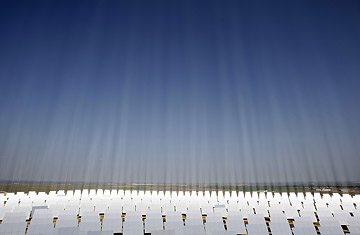
If your image of an environmentalist is an organic fiber-wearing vegan who likes to tout the health benefits of hemp tea, Fred Krupp is here to dissuade you. The environmentalists of today — and more importantly, tomorrow — are more likely to be working at a Silicon Valley solar power start-up than saving the whales. Climate change poses a fundamentally different problem, on a far vaster scale, then the local air pollution or wildlife conservation issues that environmentalists have faced before, and it demands a different kind of solution. At the core of that problem is energy, which touches every aspect of modern life, and while the old green virtues of conservation, of simple living, must play a part in our response, the key will be technology. We must invent, develop and implement — on a global scale — low-carbon means of using power. What's required, as Krupp writes in his new book, Earth: The Sequel, is a "second industrial revolution as sweeping as that effected a century ago by the likes of Thomas Edison, Henry Ford and John D. Rockefeller."
Revolutions are never easy, but as Krupp's book shows, the solutions to the climate crisis are out there — and so are the new environmentalists. The longtime president of the Environmental Defense Fund — one of the more centrist and business-friendly green groups — Krupp and his collaborator Miriam Horn traveled the U.S., meeting the scientists, venture capitalists and dreamers inventing new and better ways to use energy. (Listen to Krupp talk about climate policy in the U.S. and a zero-carbon future on Greencast.) That includes characters like the Irish-born Conrad Burke, the charismatic CEO of the young solar company Innovalight; or Alla Weinstein, a Russian immigrant who wants to bring tidal energy to the Pacific Northwest. Touring the best ideas in solar, wind and geothermal power, biofuels, even clean fossil fuels, Krupp does what might seem impossible — he delivers a global warming book that leaves you feeling hopeful. "This is a positive future, a future of abundance," says Krupp. "This is a race that will create new billionaires. It's a huge opportunity for America."
But it's an opportunity that the U.S. will miss if it fails to enact the policies to match its technology. That's the underlying message of Earth: The Sequel: while America has no shortage of would-be environmental entrepreneurs — the same class of people who brought us the Internet and biotech — those solutions won't leave the laboratory without political support. Right now there are countless smart new ways to get energy that won't destroy the Earth, but they're not price competitive with cheap fossil fuel power because they lack economic scale. As solar panels or wind turbines are produced in bulk, the price will fall — but that won't happen until government sends a strong signal to producers and energy consumers. And the only way to do that, Krupp argues, is through a carbon cap-and-trade system that sets an implicit price on dirty fossil fuel, making clean energy instantly more competitive. "You align the economic signals with the imperative that we have to save the planet and ourselves," says Krupp. "When that happens, everything changes."
The idea that new technology can get us out of the climate fix that old technology put us in is an attractive one — especially if we can make a buck while doing so. Venture capitalists invested $3 billion in clean tech in 2007, according to Dow Jones VentureSource, and they'd like a nice return. (But at least the VCs are spending money — federal investment in renewable energy research is a paltry $1 billion, or roughly a day of revenue for Exxon Mobil.) But there's no reason that business can't be a major part of the climate change solution, or that profit isn't concordant with a desire to save the Earth. Krupp writes about Jack Newman, a California surfer and former college dropout who helped found the promising biofuel start up Amyris. The company is working on ways to bioengineer better, cleaner and more efficient biofuels. It's extremely cool stuff, and potentially very profitable, but for Newman this goes beyond the money. "If we're successful, we'll be wealthy, which means we'll be in a position to impact politics," he says. "Part of my agenda has been to create a power base to change the world." As Krupp argues, if we put into place the policies that support the Jack Newmans of the country, they'll take it from there — and Earth may be one place where the sequel is better than the original.
